Answer these simple questions and we will find you the BEST prices
Which type of solar quotes do you need?
It only takes 30 seconds
100% free with no obligation

Get Free quotes from insulation specialists near you

Save money by comparing quotes and choosing the most competitive offer

The service is 100% free and with no obligation
- GreenMatch
- Insulation
- Roof Insulation
- Roof Insulation Cost
Roof Insulation Cost: Complete Prices Guide (2024)

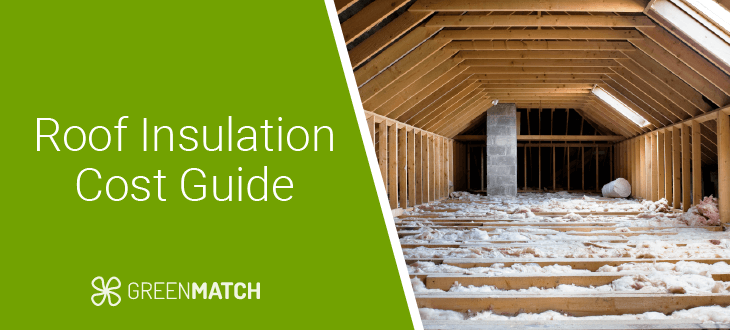
- 41% of adults in the UK find it difficult to afford their energy bills in 2024
- Effective roof insulation can reduce heat loss in your home up to 25%
- The average cost of roof insulation is between £740 to £1,700. It depends on your roof type, insulation material, property size, location, and existing insulation.
- Installing or updating your roof insulation can save you up to £230 on your energy bills and 0.6 tonnes on carbon emissions.
As energy costs continue to be a significant concern to most households in the UK, insulating your roof remains one of the most effective ways to reduce energy consumption and lower utility bills.
While energy costs are somewhat dropping in 2024 due to the Ofgem energy price cap, prices are expected to increase again in December 2024 and continue to rise into 2025 due to geopolitical concerns.
With this, around 4 in 10 adults in the UK still find it difficult to afford their energy bills, according to the National Statistics survey of 2024.
Roof insulation is a great way to lower your energy costs and reduce carbon emissions as it prevents up to 25% of heat loss in your home. It can decrease your annual carbon footprint by 0.6 tonnes and save you up to £230. With these savings, roof insulation pays for itself within 3 to 4 years.
This comprehensive guide will delve into the various roof insulation costs,breaking down the expenses based on roof types, insulation materials, and installation methods.
Whether you're considering DIY roof insulation installation or hiring a professional, understanding the costs involved will help you make an informed decision.
From basic fibreglass batts to spray foam solutions, we will provide a detailed analysis of roof insulation costs and the potential savings to ensure you choose the best insulation for your needs and budget.
Get ready for roof insulation! Let GreenMatch UK do the legwork for you. Fill out our quick 30-second form to receive up to 4 free, tailored quotes for your home—no hidden fees or obligations. Click below to get started!
- Describe your needs
- Get free quotes
- Choose the best offer
It only takes 30 seconds



Roof insulation cost
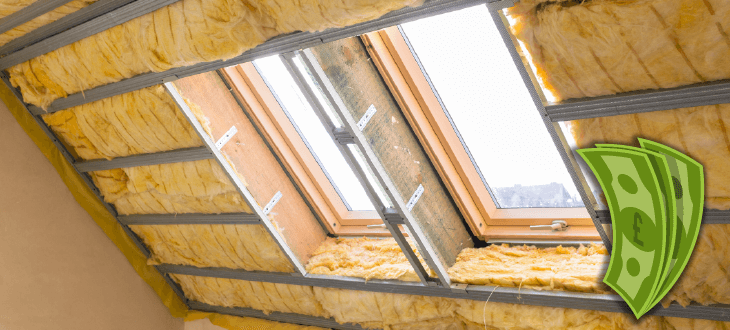
Roof insulation costs in the UK range from £740 to £1,700, influenced by roof type, insulation material, property size, location, and existing insulation. Pitched roofs generally cost more to insulate than flat roofs. Complex features or limited access can require additional labour, further increasing costs.
Labour can have a significant impact on your roof insulation cost. The longer the installation process takes, the higher the labour costs will be. Factors influencing labour time include the size of your roof and the complexity of the installation. Larger roofs and roofs with difficult access require more time and effort to insulate, thus increasing labour costs.
Additionally, your location can impact labour rates. Urban areas have higher rates than rural areas since tradespeople charge in line with the cost of living in that area. On average, labour costs can be around £250 per day per installer, making it a crucial component of the total insulation cost.
To provide an overview of insulation costs, we have compiled a table of common insulation types, including labour costs.
| Type of insulation | Average cost per 20m2 (215.278 ft2) |
|---|---|
| Fibreglass (pitched roof) | £400 |
| Mineral wool rolls (pitched roof) | £440 |
| Warm deck (flat roof) | £650 |
| Spray foam (pitched roof) | £800 |
It's important to note that the estimated insulation costs provided are general figures. The total price of roof insulation will also depend on the existing insulation in your home.
UK building regulations require roof insulation to be 270mm thick. If your home already has some insulation, your costs will be lower, but so will your potential savings.
Homes with little insulation can save between £180 and £475 annually, depending on the property type and location. In contrast, if you already have 100mm of insulation, your annual energy savings will range from £17 to £45, depending on your property type and location.
Flat roof insulation cost
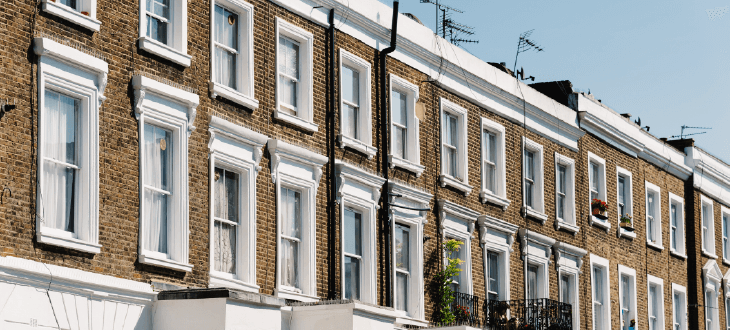
Flat roof insulation costs, on average, between £30 and £35 per square metre. The total cost depends on factors such as the type of insulation material, roof size, and the complexity of the installation.
Flat roof insulation improves energy efficiency and maintains indoor temperatures by adding insulation to flat or slightly sloped roofs. This can be achieved in three ways: below the roof deck (cold deck), above the roof deck (warm deck), or on top of the waterproofing layer (inverted deck).
Flat roof insulation is more cost-effective than pitched roofs due to easier access and less labor-intensive installation processes. The simple design of flat roofs allows for faster and more efficient insulation application, which helps reduce labour costs.
Not all insulation materials are suitable for flat roofs. The suitability of insulation material depends on its thermal performance, moisture resistance, and compatibility with flat roof design.
Common materials used in flat roof insulation include polyisocyanurate (PIR) boards, expanded polystyrene (EPS), extruded polystyrene (XPS), mineral wool, and spray foam. Additionally, materials such as PIR and EPS are cost-effective, contributing to the overall low cost of roof insulation for flat roofs.
Below, we have provided the roof insulation costs of these materials per square metre:
| Material | Average cost per m2 |
|---|---|
| Polystyrene (EPS) board | £10 |
| Polyisocyanurate (PIR) board | £12.50 |
| Polyurethane (XPS) board | £21.50 |
| Mineral wool | £33.45 |
| Spray foam | £62.50 |
There are two types of mineral wool and spray foam to choose from, which will impact the cost of materials. Mineral wool comes in the form of either glass or rock, with mineral rock being more expensive. Additionally, spray foam comes in open or closed cells, with open cells being more cost-effective.
Pitched roof insulation cost
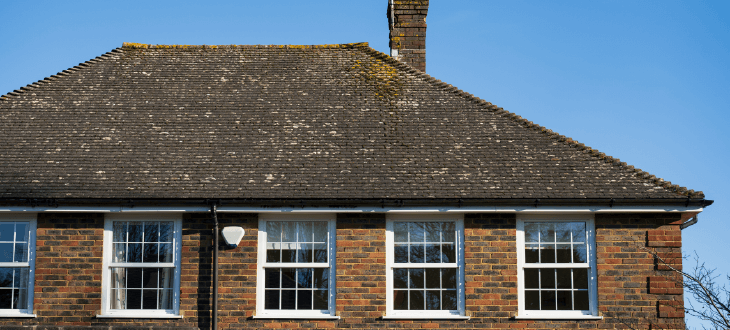
Pitched roof insulation cost between £19 to £45 per square metre, depending on the insulation material used and the complexity of the installation process.
This type of insulation is generally more expensive than flat roof insulation due to the angled structure of pitched roofs, which increases labour and material costs. According to GOV.UK, 92% of homes in the UK have pitched roofs, meaning that most people will likely encounter higher costs for insulation compared to flat roof insulation.
Pitched roof insulation involves adding insulation materials to the sloped areas of a roof to improve thermal efficiency and comfort. There are two main types of pitched roof insulation: cold and warm insulation.
Cold roof insulation is placed over and between the joists at ceiling level, leaving the attic space uninsulated and cold. It is suitable for loft spaces used only for storage.
Warm roof insulation is installed directly under the roof in the plane of the roof's pitch, creating a thermal barrier that keeps the entire roof space warm. This method requires more insulation material and labour due to the extensive coverage area and therefore increases roof insulation costs.
Regarding insulation, pitched roofs offer more material options than flat roofs. For pitched roofs, you can use materials such as (PIR) boards, expanded polystyrene (EPS), extruded polystyrene (XPS), mineral wool, and spray foam. You also have additional fibreglass, cellulose, and sheep's wool choices for pitched roof insulation.
Here are their average roof insulation costs for these materials:
| Material | Average cost per m2 |
|---|---|
| Fibreglass | £10 |
| Cellulose | £11 |
| Sheeps wool | £19.75 |
Pitched roof insulation may cost more than flat roof insulation, but different options are available depending on your budget and environmental preferences that are limited with flat roof insulation. Fibreglass is the best roof insulation for those of you who are budget conscious.
For sustainable and eco-friendly options, cellulose and sheep's wool are among the best. Choosing these materials can help you save energy and reduce your carbon footprint
Labour costs
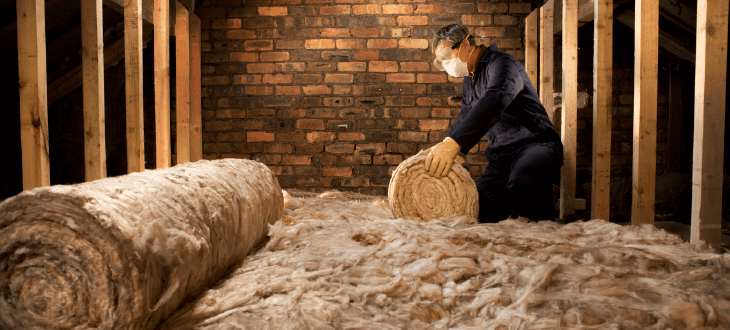
The average labour cost for roof insulation is around £250 per person daily. Roofers or roof contractors are ideal tradespeople for installing roof insulation, as they are trained to handle various types of insulation materials and are skilled in installing them in different roof structures, including pitched and flat roofs.
The time it takes to install insulation can significantly impact the overall cost of roof insulation. The complexity and size of the roof are the primary factors influencing these costs.
Typically, roof insulation will take between one to two days to install. Complex projects, like mineral wool rolls on pitched roofs or warm deck foam boards on flat roofs, may take two days.
This means that, on average, you can expect to spend £500 per person for your roof insulation costs. This cost can increase if more than one tradesperson works on the installation process and you have a more complicated roof design.
Labour costs significantly impact roof insulation expenses, underscoring the need for efficient planning and execution to manage costs effectively.
Want to make finding a reliable roof contractor easier? Don't waste time comparing quotes that might not suit your needs. GreenMatch can help! By filling out our 30-second form in the link below, you can receive up to four free quotes from local contractors tailored to your needs and budget. Working with at least one expert is essential, and GreenMatch makes this process hassle-free. Click below to start.
- Describe your needs
- Get free quotes
- Choose the best offer
It only takes 30 seconds



Roof insulation cost per m2
Understanding roof insulation costs per square metre is crucial for estimating overall expenses based on your roof's size. The average roof size in the UK is 75m2, but this can vary depending on the size and type of your property.
In the UK, roof insulation costs per square metre depend on the chosen material and its R-value, indicating thermal effectiveness. Higher-quality materials come with a higher price tag but also provide more benefits and better thermal capacity.
Below is a detailed breakdown of common insulation materials and the cost of loft insulation per square metre, including installation.
| Material | Average cost per m2 |
|---|---|
| Fibreglass | £10 |
| Polystyrene (EPS) Board | £10 |
| Cellulose | £11 |
| Polyisocyanurate (PIR) board | £12.50 |
| Mineral wool (glass) | £15.25 |
| Mineral wool (rock) | £18.20 |
| Sheeps wool | £19.75 |
| Polyurethane board | £21.50 |
| Spray foam open cell | £55 |
| Spray foam closed cell | £70 |
Factors that affect the cost of roof insulation
Roof insulation cost can be affected by several factors. As mentioned before, labour and material costs influence the overall roof insulation cost. However, there are more factors to consider. By addressing these factors ahead of time, you can better anticipate the financial investment required. Here’s what to consider:
- Existing insulation: When adding roof insulation to a home, the cost may be lower if some insulation is already in place. For instance, a detached home without insulation could cost an average of £1,200. In contrast, a roof with 100mm of insulation might only cost around £950 to meet the required standard of 270mm. This reduced cost applies only if existing insulation is dry and in good condition, verified by a professional.
- Loft purpose: The type and cost of insulation needed for your loft depend on whether it is used for storage or as a living space. If it's used solely for storage, you can opt for cold loft insulation, which involves insulating the loft floor at the ceiling level of the upper floor. On the other hand, if you intend to use your loft as a living space, warm loft insulation is needed. This type of insulation insulates the loft rafters and inner walls. Roof insulation costs are more expensive for this type due to the additional materials and labour required.
- Damp and draughts: If your home has problems like dampness and is prone to droughts, it's essential to address them before insulating the attic. Insulating a damp loft can lead to structural issues such as rot and mould. Therefore, resolving these issues first is crucial, as they could impact your overall costs.
- DIY: While do-it-yourself installation may save money at first, but a poor job could lead to costly repairs later. Some materials require specialised equipment for correct installation. Hiring a professional, although more expensive, ensures the job is done right, preventing long-term issues and expenses.
Below, we will delve into the top three most crucial factors when budgeting for roof insulation costs. These factors include the choice of materials, the size of your roof, and the accessibility of the roof.
Roof insulation material
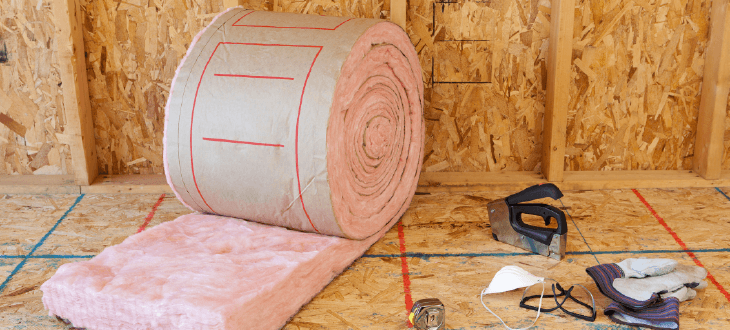
Roof insulation cost will vary widely depending on the material you choose. The cheapest option is fibreglass, which costs around £10 per m2.
Fibreglass is most budget-friendly as well as being easy to install, and provides good thermal performance. However, its manufacturing process involves glass fibres, making it less sustainable.
Polyisocyanurate (PIR) board is a mid-range option, costing approximately £12.50 per m2. PIR offers excellent thermal resistance and is more eco-friendly than fibreglass, reducing long-term energy consumption due to its efficiency and durability
Spray foam insulation is the most expensive, ranging from £55 to £70 per m2. It offers superior insulation and airtightness but is less sustainable due to the chemicals used in its production and potential health hazards during installation.
Materials like sheep wool and cellulose are among the most sustainable options. Sheep wool is renewable and biodegradable at about £19.75 per m2. Cellulose, costing around £11 per m2, is made from recycled paper and biodegradable.
The thickness of the insulation material significantly impacts the roof insulation cost. For instance, 270mm thick fibreglass insulation, which meets UK building regulations, might cost more upfront than a thinner layer but offers more significant energy savings and efficiency.
Similarly, thicker PIR or spray foam layers will increase the initial cost but provide better thermal performance and long-term savings.
Size of your roof
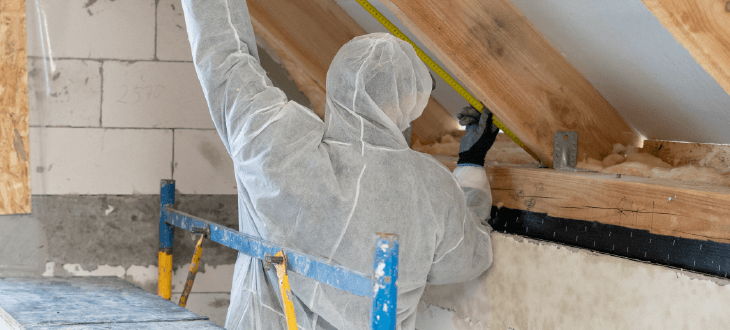
The size of your roof largely influences the roof insulation costs. Larger roofs require more materials and labour, resulting in higher costs. For example, the price is lower for a terraced home, higher for a semi-detached house, and often the highest for detached bungalows and homes due to their extensive roof areas.
Here's a comparison table for roof insulation costs based on different property types within England, Scotland, and Wales:
| Property type | Average cost range |
|---|---|
| Mid-terrace | £700 to £900 |
| Semi-detached | £750 to £960 |
| Detached | £950 to £1,200 |
| Detached bungalow | £950 to £1,200 |
Prices vary slightly in Northern Ireland. Below is a comparison table for roof insulation based on property type:
| Property type | Average cost range |
|---|---|
| Mid-terrace | £740 to £760 |
| Semi-detached | £800 to £840 |
| Detached | £1,100 to £1,300 |
| Detached bungalow | £1,600 to £1,700 |
As the roof area increases, the amount of insulation material and labour required increases, leading to higher roof insulation costs. For instance, insulating a terraced home is generally less expensive due to its smaller roof area compared to a semi-detached or detached house. These homes have larger roof spaces, requiring more extensive insulation efforts.
Easy or difficult access to the roof
Access to the roof is an essential factor in determining the cost of roof insulation. Difficult access can cause delays and higher labour costs as more time and effort are needed to work in challenging areas.
For instance, roofs with limited access may require additional equipment like scaffolding for safe and efficient installation. The rental and setup of scaffolding can significantly increase overall costs, adding to the labour expenses.
To cover an average-sized roof of about 75m2, expect to pay between £900 to £1,200 for scaffolding, increasing the overall roof insulation cost. Ensuring easy access to the roof can streamline the installation process and help control labour costs.
How to reduce your roof insulation cost
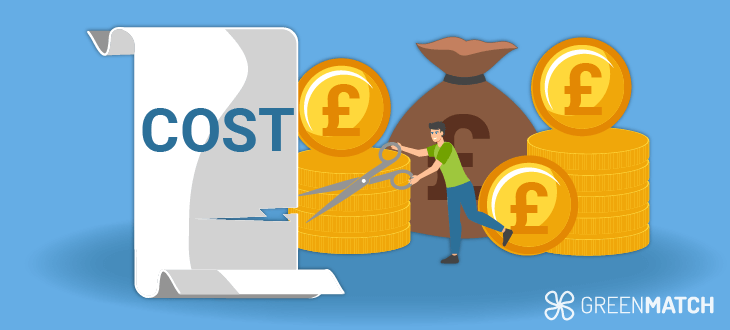
Reducing roof insulation costs can be achieved through careful planning, material selection, and smart choices. Here are several strategies to help minimise expenses:
- Cost-effective materials: Choosing the correct insulation material is essential. Fibreglass and mineral wool are typically more affordable than high-end materials like spray foam. Each material has pros and cons, so it's important to balance cost with thermal efficiency to get the best value.
- DIY installation: If you have basic DIY skills, installing the insulation can save significant labour costs. Thoroughly research the installation process and use the right protective gear. However, remember that professional installation may be more reliable and could prevent costly mistakes in the long run.
- Utilise insulation grants: Take advantage of government grants or subsidies, such as the ECO scheme in the UK, which can significantly offset insulation costs for eligible homeowners. Research and apply for these programs to reduce your out-of-pocket expenses..
- Address home issues: Ensure your roof is in good condition before adding insulation. Fix any dampness, draughts, or structural issues first. Insulating a problematic roof can lead to further damage and increased costs over time.
- Top up existing insulation: If your roof already has some insulation, consider adding an extra layer to improve its effectiveness rather than starting from scratch. This can be more cost-effective and less labour-intensive.
- Seasonal discounts: Look for seasonal discounts and promotions from insulation suppliers and contractors. Off-peak times may offer reduced rates as demand for these services tends to be lower.
- Plan for long term savings: While choosing the cheapest option upfront might be tempting, consider the long-term savings of more efficient insulation. Higher initial roof insulation costs for better materials can lead to greater energy savings and lower utility bills, making them more cost-effective in the long run.
- Optimise installation timing: Plan your installation during periods of favourable weather to avoid delays and additional weather-related costs. This can also ensure efficient and effective completion of the installation.
- Compare multiple quotes: Get quotes from different contractors for the best price. Compare various professionals' costs and services to find the most competitive rates.
Take the time to plan and budget for your roof insulation - an investment that can lead to significant cost savings. By thoroughly evaluating your options and creating a detailed budget, you can avoid unexpected expenses and keep your project within financial limits.
However, comparing quotes can be time-consuming. That's where GreenMatch comes in. Fill out our 30-second form and get up to four free, non-binding quotes from roofing contractors tailored to your needs and budget. Save time and money with GreenMatch - let us help you find the best deal for your roof insulation project efficiently and affordably.
- Describe your needs
- Get free quotes
- Choose the best offer
It only takes 30 seconds



FAQ
The cost to insulate a roof in the UK typically ranges from £740 to £1,700, depending on factors such as the type of insulation material, roof size, location and existing insulation.
Roof insulation is worth it as it can significantly improve energy efficiency, resulting in lower heating bills and a more comfortable home. Additionally, it can boost the value of your property and help the environment by reducing carbon emissions. By insulating your roof, you can save up to £230 annually on energy bills and reduce your carbon footprint by 0.6 tonnes.
Yes, roofing contractors can install insulation as part of their services, ensuring it meets building regulations and is installed correctly, especially when performing roof repairs or replacements
The cheapest way to insulate a roof is by using fibreglass insulation, which costs around £10 per square metre. Installing it yourself can help save on labour expenses, making it a budget-friendly option for homeowners.
Spray foam insulation in the UK typically costs between £50 and £70 per square metre, depending on whether you opt for open or closed-cell spray foam insulation.

Caoimhe is an experienced content writer and researcher who is passionate about providing accessible information to every reader. With a background in English literature and Sociology, she combines the two disciplines to create cohesive, well-thought-out, and well-informed pieces.
We strive to connect our customers with the right product and supplier. Would you like to be part of GreenMatch?

